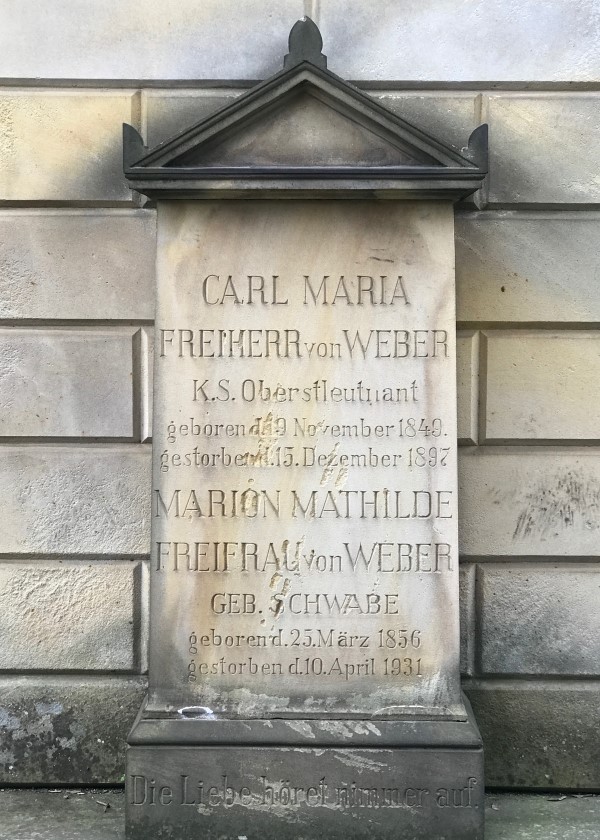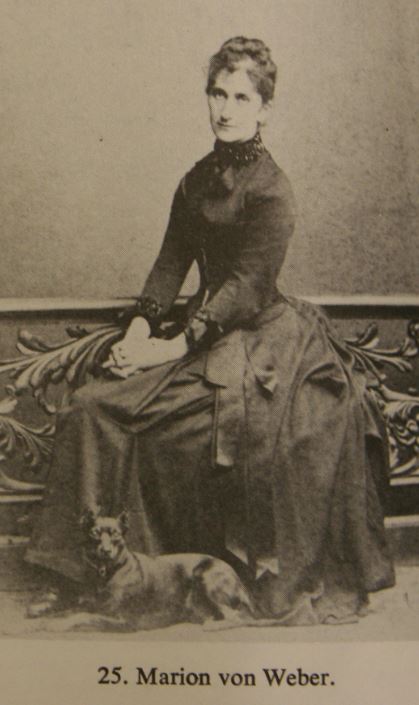Marion von Weber-Schwabe (1856-1931).
- Profession: Housewife.
- See: Familytree von Weber.
- Married to Karl von Weber (1849-1897).
- Relation to Mahler: Love affair with Gustav Mahler (1888). See Love life.
- House Marion von Weber-Schwabe (1856-1931)
- House Karl and Marion von Weber – Sebastian Bach Strasse No. 5 II.
- Year 1886, Year 1887, Year 1896 (?), Year 1904 (?)
- 1907 (summer): Visited by Willem Mengelberg (1871-1951) and Max von Schillings (1868-1933). Mahler manuscripts in her house. Destroyed in bombing 1944. What was left went to the German state Library in Berlin.
- Richard Strauss (1864-1949) also visited her.
Marion Schwabe is listed as age 5 in the 1861 census, living in Chorlton upon Medlock (essentially the area where the RNCM and Manchester University now are), in the Ward of St Luke, part of the Parliamentary Borough of Manchester. Marion’s father is given as Adolph Schwabe, age 38, a calico printer employing 650 (I think it says – hard to read) men. His wife is given as Mathilda, age 27. Marion’s brother Maximillian (age 7) is also mentioned. The house address is given as 313 Oxford Street. Adolph Schwabe knew Engels (through the Schiller-Anstalt in Manchester), and Richard Cobden, among others, and apparently returned to Berlin in 1868 “a cuckolded jackass” following his wife’s affair with the Manchester doctor Louis Borchardt.
Marion was born in Manchester in 1856 as Marion Mathilde Schwabe. Ms Riedel takes issue with a assertion that Marion was Jewish, pointing out that a Saxon officer could not have married a Jew and that she was buried, in April 1931, a Roman Catholic. Schwabe, however, is often a Jewish name and it may well be that she discarded her original faith (as Mahler did) in order to achieve social advancement. Marion Schwabe (and her family) seem to have been friendly with Joseph Joachim (1831-1907), Clara Schumann and Julius Stockhausen in the 1870s. Eugenie Schumann mentions her in her memoirs that she was a “dear friend”, who “later married a grandson of Carl Maria von Weber”.
In his early twenties, Mahler worked as junior conductor at the Leipzig Opera, a dogsbody job of long hours and little glory. Meeting a captain in the Saxon army who was grandson of the great composer Carl Maria von Weber, he set to work completing Weber’s unfinished opera, Die Drei Pintos. While visiting the Webers, he fell in love with the captain’s wife, Marion, thirty-ish and a house-proud mother of three. Never one to do things by halves, Mahler asked Marion to elope with him and, while waiting for an answer, wrote his first symphony, dashing round to her at midnight to pound out wet notes on the family piano. According to one version, he bought a pair of train tickets and was waiting for Marion on the platform when word reached him that she was staying put.
Another, more lurid account has the captain prowling through the departing train with a pistol, shooting out the headrests. Whatever really happened, the world owes Mahler’s First Symphony to Marion von Weber, his Leipzig love. Last month, the city put on a cycle of Mahler symphonies to add this wayward employee to its matchless trinity of Bach (worked there), Wagner (born there) and Mendelssohn (died there).
In an excess of local patriotism, Leipzig scholars trawled through the rest of Marion’s life to find some exceptional trait, and came up with no further incident from the day Mahler left in 1886 until her death in 1931. But tracing her origins, they found an inconvenient fact. Marion was not from Leipzig at all: she was from Manchester. Marion was born into a German-Jewish family called Schwabe, living at 313 Oxford Road in the 1861 census. Her father Adolphe was a calico printer, employing 650 men. The family were cultural omnivores. One of her uncles organised Chopin’s recitals in Manchester; an aunt lent money to the ever-needy Wagner; and, in her teens, Marion made music with the great violinist Joseph Joachim. The Schwabes were also involved with Mrs Gaskell, Thomas Carlyle, Richard Cobden, Friedrich Engels and, somehow, Florence Nightingale.
Marion was a missing link in the chain of culture and intellect that made middle-class life tolerable in dull, commercial towns and gave those towns a reputation that was often more lustrous than their nations’ capitals. In a 19th-century England known as Das Land ohne Musik – “the land without music” – Manchester was a singular haven of beauty, where Charles Hallé (another friend of the Schwabes) formed an orchestra and citizens of worth went to concerts with the same sense of obligation as they attended church. Those lower down the social scale crammed the the Free Trade Hall to its rafters.
Manchester may have grown on the humid air and rainfall required for textile mills, but its mill-owners fostered an ethos of self-improvement and education that stood in marked contrast to the lazy, sleazy ways of London and other fleshpots down south. Leipzig, likewise, was a mercantile hub whose giant trade fairs drew furriers from Russia, paper merchants from Sweden and diamond cutters from Belgium. It lacked the visible amenities of Berlin, but made up for them with a magnificent musical tradition, a questing university (Goethe, Nietzsche, Heisenberg) and a publishing industry that invented modern design (Insel Verlag) and the paperback book (Tauchnitz Edition), long before Allen Lane copied its achievements at Penguin.
Letters
Marion von Weber an Friedrich Wilhelm Jähns in Wildbad
Rostock, 26. Juli 1880
Incipit: Du wirst sehr erstaunt sein von mir einen Brief
Zusammenfassung: teilt Jähns mit, daß ihr Mann Carl in Güstrow im Eßsaal eines Hotels ein Bild fand, das angeblich Carl Maria v. Weber darstellen soll, obwohl er keine Ähnlichkeit fand. Jähns möchte sich äußern, ob er davon gehört hat. Der Wirt habe es einem Herrn v. Suckow abgekauft, einem Gustbesitzer, der jetzt in Berlin lebe
Kennung: A044332 in Bearbeitung
Marion von Weber an Friedrich Wilhelm Jähns in Berlin
Dresden, 17. November 1882
Incipit: Endlich kann ich Dir die gewünschte Auskunft schicken
Zusammenfassung: es geht um die Tagebucheintragungen der empfangenen und geschriebenen Briefe Beethoven betreffend. J. hatte einen diesbezüglichen Fragezettel geschickt, den Marion bestätigt
Kennung: A044407 in Bearbeitung
Marion von Weber an Hartmann
Dresden, 8. März 1905
Incipit: Bei Ihrem Interesse an Staegemann, kann ich mirs nicht
Zusammenfassung: sendet ihm Wiener Kritik über Helene; hat sich geärgert, daß Strauss im abendlichen Konzert alle Ehren einsteckte, die nur Schuchs Einstudierung zu verdanken seien; sie bewundere Strauss als Komponisten, zum Lieben sei seine Sinfonia domestica aber nicht;
Kennung: A045937 in Bearbeitung

Grave Karl von Weber (1849-1897) and Marion von Weber-Schwabe (1856-1931), Old Catholic cemetery, Dresden. See also Familytree von Weber.

